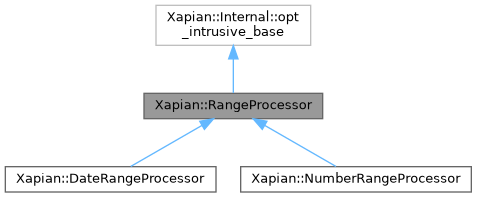Base class for range processors. More...
#include <queryparser.h>
Public Member Functions | |
| RangeProcessor () | |
| Default constructor. | |
| RangeProcessor (Xapian::valueno slot_, const std::string &str_=std::string(), unsigned flags_=0) | |
| Constructor. | |
| virtual | ~RangeProcessor () |
| Destructor. | |
| Xapian::Query | check_range (const std::string &b, const std::string &e) |
| Check prefix/suffix on range. | |
| virtual Xapian::Query | operator() (const std::string &begin, const std::string &end) |
| Check for a valid range of this type. | |
| RangeProcessor * | release () |
| Start reference counting this object. | |
| const RangeProcessor * | release () const |
| Start reference counting this object. | |
Protected Attributes | |
| Xapian::valueno | slot |
| The value slot to process. | |
| std::string | str |
| The prefix (or suffix with RP_SUFFIX) string to look for. | |
| unsigned | flags |
| Flags. | |
Detailed Description
Base class for range processors.
Constructor & Destructor Documentation
◆ RangeProcessor()
|
inlineexplicit |
Constructor.
- Parameters
-
slot_ Which value slot to generate ranges over. str_ A string to look for to recognise values as belonging to this range (as a prefix by default, or as a suffix if flags Xapian::RP_SUFFIX is specified). flags_ Zero or more of the following flags, combined with bitwise-or (| in C++): - Xapian::RP_SUFFIX - require str_ as a suffix instead of a prefix.
- Xapian::RP_REPEATED - optionally allow str_ on both ends of the range, or only on the non-empty end - e.g. $1..$10, ..$10, 5m..50m, or 5m... By default a prefix is only checked for on the start (e.g. date:1/1/1980..31/12/1989 or date:..31/12/1989), and a suffix only on the end (e.g. 2..12kg or 2..kg).
Member Function Documentation
◆ check_range()
| Xapian::Query Xapian::RangeProcessor::check_range | ( | const std::string & | b, |
| const std::string & | e ) |
Check prefix/suffix on range.
If they match, remove the prefix/suffix and then call operator()() to try to handle the range.
◆ operator()()
|
virtual |
Check for a valid range of this type.
Override this method to implement your own range handling.
- Parameters
-
begin The start of the range as specified in the query string by the user. end The end of the range as specified in the query string by the user (empty string for no upper limit).
- Returns
- An OP_VALUE_RANGE Query object (or if end.empty(), an OP_VALUE_GE Query object). Or if the range isn't one which this object can handle then Xapian::Query(Xapian::Query::OP_INVALID) will be returned.
Reimplemented in Xapian::DateRangeProcessor, and Xapian::NumberRangeProcessor.
Referenced by Xapian::QueryParser::add_valuerangeprocessor().
◆ release() [1/2]
|
inline |
Start reference counting this object.
You can transfer ownership of a dynamically allocated RangeProcessor object to Xapian by calling release() and then passing the object to a Xapian method. Xapian will arrange to delete the object once it is no longer required.
◆ release() [2/2]
|
inline |
Start reference counting this object.
You can transfer ownership of a dynamically allocated RangeProcessor object to Xapian by calling release() and then passing the object to a Xapian method. Xapian will arrange to delete the object once it is no longer required.
Member Data Documentation
◆ flags
|
protected |
Flags.
Bitwise-or (| in C++) of zero or more of the following:
- Xapian::RP_SUFFIX - require str as a suffix instead of a prefix.
- Xapian::RP_REPEATED - optionally allow str on both ends of the range - e.g. $1..$10 or 5m..50m. By default a prefix is only checked for on the start (e.g. date:1/1/1980..31/12/1989), and a suffix only on the end (e.g. 2..12kg).
Referenced by RangeProcessor(), and RangeProcessor().
◆ slot
|
protected |
The value slot to process.
If this range processor isn't value-based, it can ignore this member.
Referenced by RangeProcessor(), and RangeProcessor().
The documentation for this class was generated from the following file:
- xapian/queryparser.h
Generated by Doxygen 1.15.0
